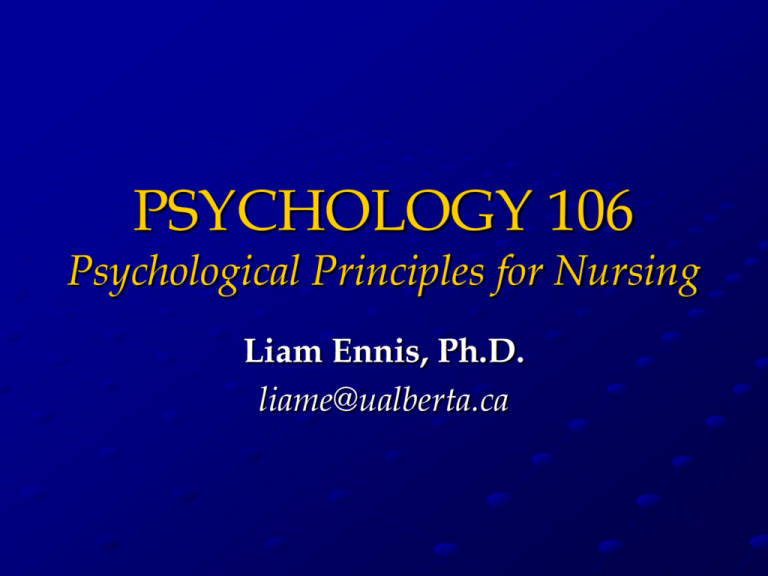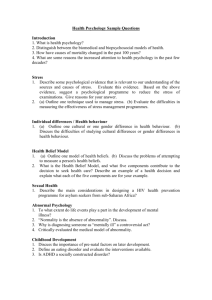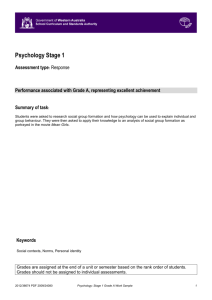PSYCHOLOGY 106 Psychological Principles for Nursing
advertisement

PSYCHOLOGY 106 Psychological Principles for Nursing Liam Ennis, Ph.D. liame@ualberta.ca Prologue Cover the basics of psychological principles and show explain how these principles can be applied to solve human problems (and wherever possible, nursing-related human problems. Introductory course – Cover lot’s of ground, but in a primarily cursory fashion If you have questions… ask them. Psychology & Science Psychology is the science of the mind and behaviour Psychological data are always based on observed behaviour - inferences made re: mind Behaviour: Any process or activity that is directly observable Mind: Can’t be observed directly (e.g., thought processes, motivation, etc.) Black Box History of Psychology • First ‘psychologists’ were philosophers (e.g., Aristotle, Socrates, Plato) • Speculation about the source of human knowledge, nature of mind and soul, mind-body relationship, whether these constructs could be studied objectively • Determinism vs. Free Will History of Psychology • Descartes - French philosopher • • • Dualism - man consists of 2 distinct but conjoined entities: Material body and immaterial soul Body is part of natural world and can be studied scientifically Soul - not bound by natural law - “unstudyable” History of Psychology Descartes cont’d: concerned with mechanical processes of behaviour which he felt were unrelated to soul Animals don’t have souls, yet engage in many basic physiological behaviours that humans do Any activity performed by humans that is qualitatively no different from what animals can do, occurs without the soul role of senses, organs, reflexes Thomas Hobbes (1588-1679) British - struggle between church and state tutor to King Charles II Believed soul to be a meaningless concept Materialism: nothing exists but matter & energy All human behaviour can be understood re: physical processes Thought = product of brain-body machinery, subject to natural law Empiricism John Locke – philosopher in the early 1600’s Empiricism: Knowledge is gained through our senses and experience, not through speculation British Empiricists: all human knowledge and thought derive from sensory experience Thought subject to natural law and may be studied scientifically Psychophysiology 19th century - emphasis on machinery of behaviour Central nervous system, sensation and perception Reflexology - every human behaviour understood as a reflex, initiated by environmental stimuli localization of function - Broca Ivan Pavlov 1905 Nobel Prize for dog salivation research Conditioned reflexes Reliance on precise measurement of behaviour and presentation of stimuli Charles Darwin Consistent with theory of evolution, traits and behaviours can be examined for the function it serves in allowing the organism to survive and reproduce in natural environment Helped convince intellectual world that humans are part of nature, just like animals, and can be understood through the methods of science Wilhelm Wundt (1832-1920) • Commonly viewed as the father of psychological science • Wrote first psych text ever • Founded the first psych lab at University of Leipzig (Germany) in 1879 • Utilized introspection to study consciousness • • To look inward to examine one’s own conscious experience examination of the simplest mental processes Edward Titchner Student of Wundt’s Laboratory at Cornell University Pioneered the Structuralist view of psychology The proper goal of psychology was the identification of the elements/structures of the mind and determine how they combine with one another Wundt correctly warned of limitations of introspection William James First psychological lab & text in America – Harvard University (1890) Rejected structuralism - can’t understand a house by looking at the bricks Influenced by Darwin – natural selection and adaptive behaviour Functionalism: the study of the function of behaviour, and how people behave in order to adapt to their environments. Sigmund Freud Pioneered psychoanalysis in order to understand how the unconscious influences human behavior. Conceptualized the mind as having three components; the Id, responsible for our drives to meet our physiological needs and desires; the Superego, incorporates the rules and morals of the society we live in the Ego, the conscious part of our minds that mediates between the Id and Superego so that we may get our needs met in a socially acceptable way. John B. Watson Mental constructs were of no value in explaining human behaviour, and only obscured psychological investigation and theory All behaviour reflexive – all behavior can be understood as reactions/responses to events in the environment Spent latter part of his career in advertising B.F. Skinner Behaviorist – Operant Learning & Conditioning Disagreed with emphasis on reflexes Focused on consequences of behaviour Behaviour contingent on influence of reinforcers in one’s environment Behaviourism dominated psychology from 1920’s – 1980’s Albert Bandura Social Learning Theory Observational learning Aggression/Bo-Bo Doll Modelling Carl Rogers Felt psychoanalysis and behaviourism devalued the conscious human mind Humanistic or Client-Centered Psychology (Maslow) Theory based on assumption that we all have an inherent actualizing tendency - beyond basic needs tendency stunted by others who criticize and inhibit Unconditional, positive regard Cognitive Psychology Increasingly popular since 1970’s emphasizes how people take in, organize and make mental representations and store information. Also study how these processes effect behavior thought mediates behaviour How we think about things influences emotion, decision making, behaviour Biology & the Brain Role of brain functioning as it relates to behaviour and psychological processes Heredity and behavioural genetics neurochemical processes of memory & thought magnetic fields technologically based


